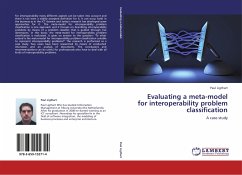For interoperability many different aspects can be taken into account and there is not even a widely accepted definition for it. It can occur both in the business as in the ICT domain and today s research has developed some approaches for it. The meta-model for interoperability problem classification is one approach and it focuses on describing interoperability problems by means of a problem classifier that is guided through five dimensions. In this book, the meta-model for interoperability problem classification is evaluated. It gives an answer to the question: "To what extend is the meta-model for interoperability problem classification suitable to represent interoperability problems?" The research is performed as a case study. Two cases have been researched by means of conducted interviews and an analysis of documents. The conclusions and recommendations can be useful for professionals who have to deal with all kinds of interoperability problems.
Bitte wählen Sie Ihr Anliegen aus.
Rechnungen
Retourenschein anfordern
Bestellstatus
Storno








